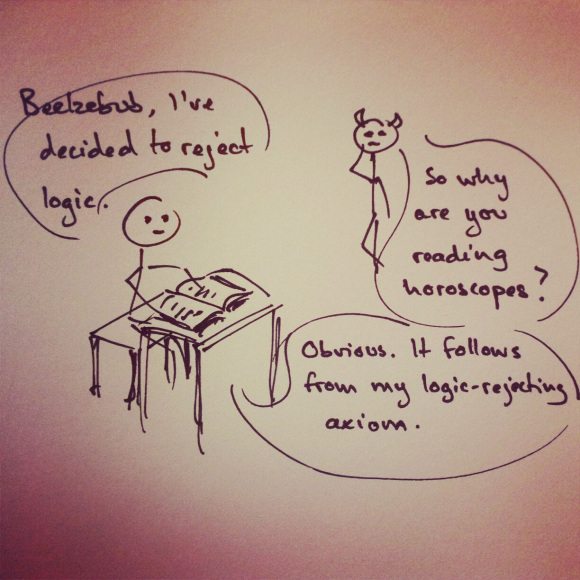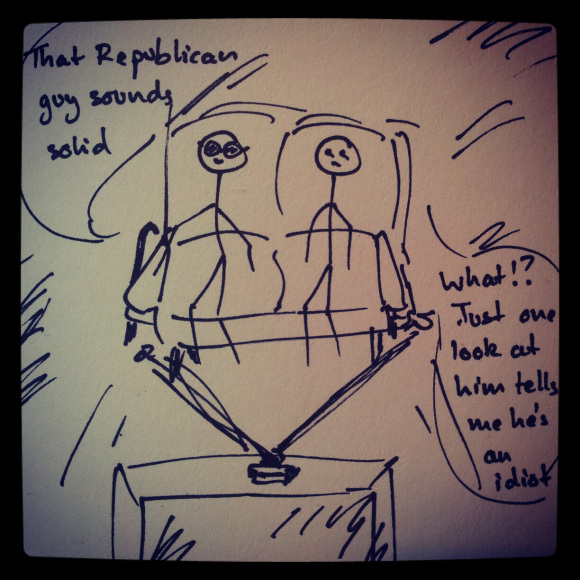Are your actions guided by logic? It seems not.
Not the cognizant kind, anyway.
We all know first impressions can be remarkably shallow. Who hasn’t been in a pub and automatically picked out the smouldering shape of sexiness at the bar? Or equally immediately given a new co-worker the stink-eye because they've chosen some cringe-worthy combination of clothes to parade in? (the kind of clothes you’d imagine your granddad donned as sexy war gear in blackadder-style transvestite fetishism)
Yet people generally pride themselves – particularly for important matters – on overcoming such primitive, caveman-dwelling preferences. We adhere to logic, to reason, and we hold accurate reasons for our values and actions.

Now those of you who have done a bit of reading around will be shaking their heads. – “We know there’s some unavoidable level of bias we can’t escape” you’ll be thinking. And you’ll be right! But even those of us who are open-minded about our preconceptions and appearance-based favorability can be surprised by the extent to which this reaches – Not only affecting the political candidate we vote for, the sex of the people we hire or the decision of who to trust: ~~ appearance and prior-associations contribute to characteristics we assign people in our memories and contribute a surprising amount to financial decisions.
Just remember how we evaluated Gordon Brown – weren't we disproportionately harsh in comparison?


In a certain Scientific American article we have the classic example of the poll variation in the first televised debate between Kennedy and Nixon: while Kennedy was in prime health (contrasting with the rather grey, recently ill Nixon), those paying visual attention rated him higher. Nixon however, whose rich and resonant voice over radio convinced the listeners that his policies would hold truer than the weaker-voiced, higher-pitched Kennedy, was given the approving nod from the keen-eared demographic.

Now such preferences aren't only scary on a nation-wide scale (thankfully we’d never get glamour models deciding policies, they’d be bored ..we hope) but on a personal level too. Research done by the Aalto University School of Economics in 2011 showed that stock market decisions are strongly influenced by political association (& imagine the highly theoretical cycle: Elect politician, let’s call him “Shrub”. Shrub invests terrible resources attacking other countries, allows crazy lending schemes and financial payout escalation.. it might not end well, mm? But he’s a smooth chatty schmoozer indeed)
A similar but more subconscious bias comes through identity. Research has shown that even scientists of both genders discriminate against female applicants; finding the females less competent, less hire-able and deserving of lower salary in a study using identical male/female applications. Such identity association almost certainly would extend to ethnic groups, identification of sexual preferences – indeed pretty much any group we associate with (Who hasn't looked Republican Sarah Palin in the eyes and seen the gleam of gun-toting fever?).
Such bias acts in surprising ways. A study of appearance-based memory in 2012 found that not only did we use appearance-based judgement for candidate competency, but we made and remembered assumptions of individuals’ characteristics based upon facial features. A given set of physical characteristics could even change how we remembered the individual’s actions during an event, and how we would assign responsibility or blame to them.
A crucial examination in this paper dealt with the ‘babyface’ phenotype – people with rounded, baby-like features were less likely to be recommended or hired, given lower credibility and legal responsibility. The fact that such phenotypes are more likely to be absolved from an intentional crime in a court of law is fantastic, yet seemingly true. (The myth of the black widow lives on).

What all of this seems to be suggesting is that appearances manipulate us – and the savvy businessman can take advantage of this. Not only appearances, but what we say, how we phrase it and how we interact with you. If you ever meet me at some point you’ll find me enthusing about Robert A. Cialdini’s book Influence. It has a fantastic amount of research info on how salespeople work, how to push into queues without causing offence, how to get help when you’re in a crowd. A lot of this has now permeated into the wider culturesphere, yet this book (along with my other favourite, The Game by Strauss) gives some great clues into how to manipulate a person for your bidding.
Taking a financial example: playing the stock market has been compared to gambling. A gambler can convince himself to maintain optimism during a lengthy losing streak by counting a loss as a ‘near-miss’. Similarly an investor on the stock market can be convinced by their financial advisor to keep playing by informing them beforehand of the loss. Interestingly whilst this doesn't mitigate either the incompetency of the advisor or the overall negative market direction, the neurological response has been shown to be the same: maintaining hope. Reinterpretation of data and the way we accept it from a person or scenario is then key to maintaining clients. Just as a gambler can view a loss in terms of ‘learning’, so can an investor. So even whilst losing a client’s money, a financial investor can miss being fired by a combination of sharing values in a ‘relationship’ basis with the client, and maintaining positivity. (This can unfortunately lead to financial predation.. read more about that here).

Previous posts have included links via text, but for ease of finding them:
https://www.scientificamerican.com/article.cfm?id=why-your-brain-irrational-about-obama-romney
https://www.sciencedirect.com/science/article/pii/S0304405X10002539
https://www.springerlink.com/content/gn4668088044404x/
https://papers.ssrn.com/sol3/papers.cfm?abstract_id=2011914
Next article (without tangents): Neuromarketing!